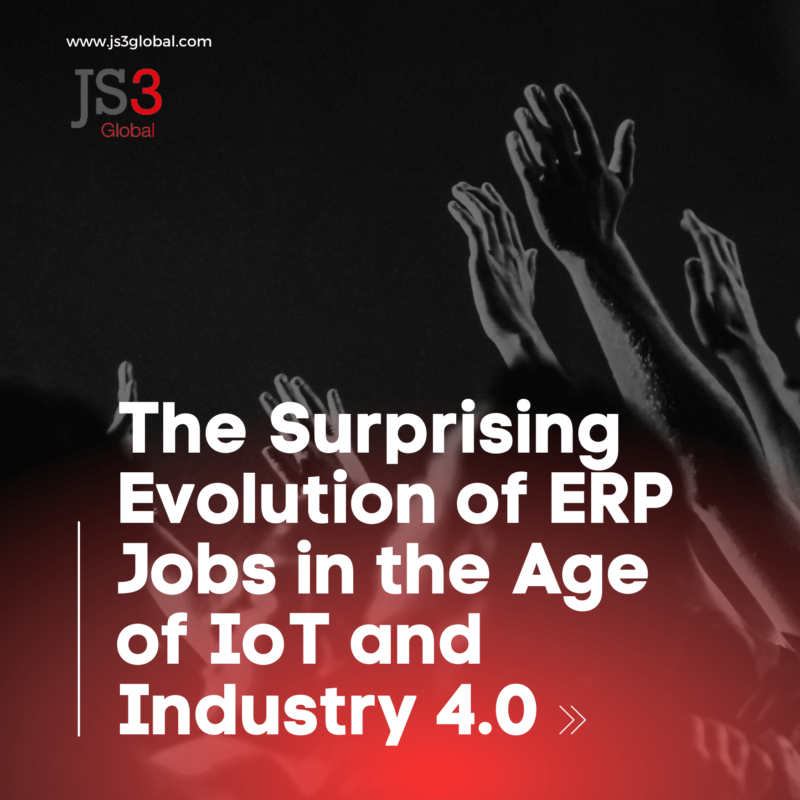The Surprising Evolution of ERP Jobs in the Age of IoT and Industry 4.0

The transformative forces of Industry 4.0 and the Internet of Things (IoT) are not only revolutionising manufacturing and operations, but they are also reshaping the landscape of workforce requirements. As forward-thinking businesses increasingly integrate IoT technologies and embrace the principles of Industry 4.0, the demand for ERP talent is undergoing a significant evolution, and you need to be ready for it.
Industry 4.0 (the fourth industrial revolution is the paradigm shift in manufacturing and operations). Unlike its predecessors, Industry 4.0 is not characterised by one technological breakthrough, but rather by the merging of various digital technologies. These include the things you are aware of; Internet of Things (IoT), artificial intelligence (AI), machine learning (ML), robotics, augmented reality (AR) etc. The synergy of these technologies brings forth unprecedented levels of automation, data-driven decision-making, and interconnectedness across the entire value chain. Music to the ERP world’s ears.
Below we delve into how the marriage of IoT and Industry 4.0 is influencing the skills, roles, and expectations of ERP professionals.
From Traditional to Tech-Savvy
The advent of IoT and Industry 4.0 has given rise to a demand for ERP professionals who possess a unique blend of skills. While traditional ERP roles required expertise in process optimisation, data management, and software implementation, today’s ERP talent needs to have a broader understanding of cutting-edge technologies and their integration with ERP systems.
What are the Key Shifts in ERP Talent Demand?
- Data Integration and Analytics
As IoT generates an influx of real-time data, ERP professionals are expected to possess data integration and analytics skills. They need to be adept at connecting various data sources, mining insights from massive datasets, and translating these insights into actionable strategies. The ability to work with advanced analytics tools and interpret data patterns becomes invaluable in enhancing decision-making processes.
- Predictive Maintenance and AI
Predictive maintenance, enabled by IoT data and artificial intelligence, is becoming a core function of modern ERP systems. ERP professionals are required to comprehend machine learning algorithms, develop predictive models, and collaborate with data scientists to ensure the seamless implementation of predictive maintenance strategies.
- IoT Integration Expertise
The integration of IoT devices into ERP systems demands ERP professionals who understand the intricacies of IoT technology. This includes knowledge of sensor networks, communication protocols, and data security considerations. The ERP talent of the future should be capable of bridging the gap between traditional enterprise systems and the new realm of connected devices.
- Agile Problem Solvers
Industry 4.0 introduces dynamic and interconnected processes. ERP talent must be agile problem solvers who can quickly adapt to changing scenarios, identify bottlenecks, and optimise processes in real-time. Their ability to respond swiftly to disruptions and leverage data-driven insights is critical in maintaining operational efficiency.
- Cross-Functional Collaboration
IoT and Industry 4.0 emphasize the importance of cross-functional collaboration. ERP professionals need to collaborate with IoT engineers, data scientists, manufacturing experts, and supply chain managers. Effective communication and the ability to work across diverse teams are essential skills for bridging the gap between technology and business needs.
Opportunities for Talent:
While the evolution of ERP talent presents challenges, it also brings forth opportunities. If you are an ERP professional to better position yourself as an indispensable asset to organizations and gain a competitive advantage, you can proactively enhance your skill sets and embrace the technological advancements of Industry 4.0
Moreover, as the demand for ERP professionals with IoT expertise grows, the job market, we have found continues to open up for those who can seamlessly merge traditional ERP knowledge with advanced technology acumen. We have noticed that professionals who can design and implement IoT-enabled ERP solutions are placed quicker and will find themselves in high demand, contributing not only to operational efficiency but also to strategic growth.